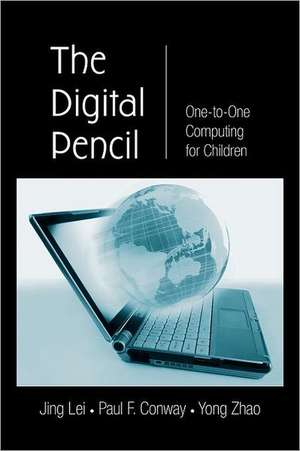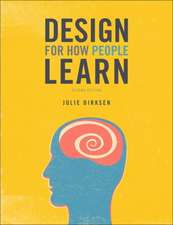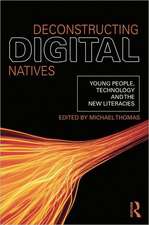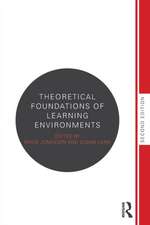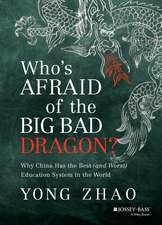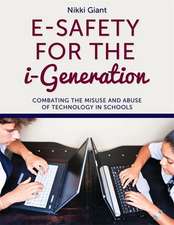The Digital Pencil: One-to-One Computing for Children
Autor Jing Lei, Paul F. Conway, Yong Zhaoen Limba Engleză Paperback – 21 dec 2011
| Toate formatele și edițiile | Preț | Express |
|---|---|---|
| Paperback (1) | 274.23 lei 6-8 săpt. | |
| Taylor & Francis – 21 dec 2011 | 274.23 lei 6-8 săpt. | |
| Hardback (1) | 677.41 lei 6-8 săpt. | |
| Taylor & Francis – 19 sep 2007 | 677.41 lei 6-8 săpt. |
Preț: 274.23 lei
Nou
Puncte Express: 411
Preț estimativ în valută:
52.47€ • 54.90$ • 43.59£
52.47€ • 54.90$ • 43.59£
Carte tipărită la comandă
Livrare economică 02-16 aprilie
Preluare comenzi: 021 569.72.76
Specificații
ISBN-13: 9780415877770
ISBN-10: 0415877776
Pagini: 272
Dimensiuni: 152 x 229 x 14 mm
Greutate: 0.37 kg
Ediția:1
Editura: Taylor & Francis
Colecția Routledge
Locul publicării:Oxford, United Kingdom
ISBN-10: 0415877776
Pagini: 272
Dimensiuni: 152 x 229 x 14 mm
Greutate: 0.37 kg
Ediția:1
Editura: Taylor & Francis
Colecția Routledge
Locul publicării:Oxford, United Kingdom
Public țintă
ProfessionalRecenzii
"The book is worth reading and it constitutes a useful source of information for graduate students who are searching for various data and bibliographical information about laptop programs in schools. It is also likely to prove useful to policy makers and school district technology coordinators who can benefit from the various laptop computer experiences at schools described in the book." -- E-Learning (2008), Volume 5, Number 4
"The Digital Pencil describes the emergence and use of one-to-one computing programs within education. Written by three researchers whose combined laptop research touched 31,250 students, it is informed by research from 16 major ubiquitous computing projects across nine countries and six US states…The book is written to satisfy both the academic and practitioner audience with extensive citations to theory and research in addition to practical suggestions."-- Joan E. Hughes, Literacy (April 2009), Volume 43, Number 1
"For the educators among us who prefer to have a guide when they investigate new uses of technology for teaching and learning, this book serves as a source to understand the power and advantageous use of digital pencils, or portable, digital devices."--Susan Farber, Education Review, January 2010
"The Digital Pencil describes the emergence and use of one-to-one computing programs within education. Written by three researchers whose combined laptop research touched 31,250 students, it is informed by research from 16 major ubiquitous computing projects across nine countries and six US states…The book is written to satisfy both the academic and practitioner audience with extensive citations to theory and research in addition to practical suggestions."-- Joan E. Hughes, Literacy (April 2009), Volume 43, Number 1
"For the educators among us who prefer to have a guide when they investigate new uses of technology for teaching and learning, this book serves as a source to understand the power and advantageous use of digital pencils, or portable, digital devices."--Susan Farber, Education Review, January 2010
Cuprins
Selected Contents: 1 The Digital Pencil: An Introduction 2 A Historical View of Technology in Schools 3 Arguments for One-to-One Computing 4 Conditions for Laptop Uses in Schools 5 How Students Use Laptop Computers 6 Laptops vs. Handhelds 7 Parents and One-to-One Computing 8 Evaluating and Studying One-to-One Computing 9 Final Thoughts on Laptops for Children
Descriere
Descriere de la o altă ediție sau format:
This book takes a serious historical and international look at the "digital pencil" movement to equip every student with a computing device with wireless connection. Using an ecological perspective as an overarching framework, and drawing on their own studies and available literature that illuminate the issues related to one-to-one computing, the authors present well-reasoned discussions about a set of complex and critical issue facing policy makers, educators, students, parents, and the general public.
This book takes a serious historical and international look at the "digital pencil" movement to equip every student with a computing device with wireless connection. Using an ecological perspective as an overarching framework, and drawing on their own studies and available literature that illuminate the issues related to one-to-one computing, the authors present well-reasoned discussions about a set of complex and critical issue facing policy makers, educators, students, parents, and the general public.
